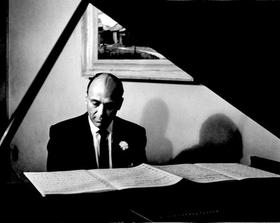Stories of Standards: Body and Soul
Tune in to First Take with Lando and Chavis – weekdays from 6-9 am MT – for Stories of Standards to hear our favorite versions of this song all week long!
While in London, Johnny Green wrote “Body and Soul” in 1930 for Gertrude Lawrence. Although the British Jack Hylton and His Orchestra made the first recording, it was American Paul Whiteman and His Orchestra who made the song a hit, starting as #1 on 10/11/30 and staying there for six weeks. Banned from radio for its overtly sexual lyrics many recordings were made in the 1930s and 1940s, including the first recording ever made by the Benny Goodman Trio (Benny Goodman on clarinet, Gene Krupa on drums, Teddy Wilson on piano). Jazz Standards ranks “Body and Soul” as #1 in its list of the top hundred jazz standards.
Johnny Green (1908-1989) wrote, composed, arranged and conducted. With the encouragement of his wife (the former Carol Foulk) he quit the stockbroker job his father had forced upon him in order to focus on music. “Body and Soul” was one of his earliest and best-known compositions; he went on to win four Academy Awards for film scores, a fifth for producing a short musical film and was inducted into the Songwriters Hall of Fame in 1972. He was a board member of ASCAP and had a radio series “World of Music”.
Edward Heyman (1907-1981), Robert Sour (1906-1985) and Frank Eyton (1894-1962) collaborated on the lyrics of “Body and Soul.”
Heynman had started writing musicals while attending the University of Michigan, went on to write scores for Broadway shows, films and Radio City Music Hall productions before going to Mexico City where he produced shows for an English-speaking theater group from the mid-‘50s until 1961. Heynman’s other collaborations include “I Cover the Waterfront” (1933) and “You Oughta Be in Pictures” (1932).
Robert Sour collaborated with Mae Carlisle on “Walkin’ By the River” (1940) and “I See a Million People” (1941). With Helen Bliss, Sour wrote “Twitterpated” and “Thumper Song,” for the 1942 movie “Bambi”. As vice-president of BMI Sour helped establish the BMI-Lehman Engel Musical Theatre Workshop, formed to preserve the integrity and tradition of musical theater by teaching its principles to young composers and lyricists.
While Frank Eyton is best known for his contributions to “Body and Soul”, most of his career was spent in London’s West End theater scene.
Stories of Standards is sponsored by ListenUp – If you love music, you’ll love ListenUp.

9(MDA3NDU1Nzc2MDEzMDUxMzY3MzAwNWEzYQ004))
Become a Member
Join the growing family of people who believe that music is essential to our community. Your donation supports the work we do, the programs you count on, and the events you enjoy.
Download the App
Download KUVO's FREE app today! The KUVO Public Radio App allows you to take KUVO's music and news with you anywhere, anytime!